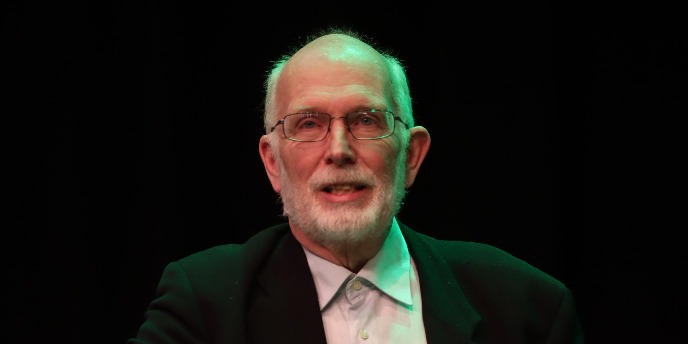In the Spotlight: Lambert Schomaker

-
Name: Lambert Schomaker
-
Country of origin: Netherlands
-
Position: Full Professor and chair Autonomous Perceptive Systems. Co-chair DSSC, Programme board CogniGron
-
Year started working at BI (or previous institute): 2001 started as a full professor in ArtificiaI Intelligence (AI) at Groningen University, The Netherlands, as director Research & Education at the ALICE institute
-
Webpage: https://www.ai.rug.nl/~lambert/
Can you remember the first day you walked into the building/institute and what your impression was at that moment?
I will need to give some background information. In 2001 AI was embedded at the then called faculty of Psychologische, Pedagogische en Sociologische Wetenschappen (now Faculty of Behavioural and Social Sciences). The situation at that faculty was not ideal, to put it mildly. Early 2007 I was invited by Douwe Wiersma (in those days the dean of the science faculty) and Frank Zwarts (rector of UG) when the first stone of the Bernoulliborg was being laid. A year later we moved into this building on the 3rd floor, and that meant we also moved from the social to the science faculty.
From the new building we expected to have lab space in general and more specifically robot labs. But the problem was that this building was designed as having office space for administrative purposes. We immediately found out there were limitations. But the building was our “own” and that was promising. And people started to take us more seriously as a discipline and as an institute (ALICE ed.).
What motivates you?
My fascination for autonomy in complex systems. It already started as a kid, when I was fascinated by electronics and robotics. You have to realize that there was a lot happening in electronics in the sixties. And later as a student, I became interested in the brain as well. It is the combination of electronics and the brain.
What are you most proud of that you have achieved so far?
Technically it would be the work for Monk: an on-line trainable, continually-learning search engine for handwriting. As of 2009 many technical solutions needed to be provided that are far outside the working context of individual researchers with a desktop computer. In the Target project, in collaboration with IBM and with the support from CIT, we briefly had a global record of 1.3 billion images on what looked like a single 'disk' to the users and the search engine software. The number of human-confirmed harvested word-image labels exceeded 1.1 million samples for training. Even today, such numbers are uncommon and very far from the small working ecosystems for AI students who use common python tools.
It was an eyeopener, because it was predicted beforehand that it was not possible to use file storage of this scale together in cyclic interaction with high-performance computing.
Is there anything you want to achieve or establish with your work?
That would be the latest achievement, the HAICu project. The aim of HAICu is to provide digital ways to read all kinds of interesting collections from cultural inheritance. There is a lot of data, like paper archives, video, personal reports and experiences This means you have evidence but there are still different views and interpretations of the data. You can use AI to evaluate stories and generate alternative stories. The challenge is to develop methods that are available to describe more objectively where it comes from, how it was constructed.
With the HAICu project you immediately show that alternative opinions are possible.
When you were a kid, did you already envision yourself doing something like this?
YES! I knew this is what I wanted to do in the future.
During my studies, around 1978, I learned to program computers and that also was an important event. I realized programming works faster than making electronic devices. In software everything is faster.
Is there anything that was organized at your previous job that might be a good suggestion for our institute?
Before I came to Groningen in 2001, I was working in Nijmegen. There they organized presentations from really famous scientists from all over the world. More than monthly, on Fridays, and the rooms were completely filled. As a young researcher talking to these famous people, nobel prize winners etcetera, was extremely motivating: “We can also do what they are doing, or even better”.
What do you like and dislike about The Netherlands, Groningen and the Dutch people/culture?
You have to realize I have always been in international settings, at work. But also my mother is German, so I am not fully Dutch.
In European projects Dutch people were the ones that made the connection. The Dutch are always in the middle and connecting the parties.
But I must say, the Dutch in general are insensitive. They don’t really see what is going on in international settings and are missing the details. Dutch people are immediately interacting, talking, but not really observing.
What personal detail can you share that people might not know about you?
I still like electronics: I have all kinds of devices in the house that are automatically controlled: domotics. A central computer controls everything and I make sure this computer always works.
Lambert retired on 1 December 2023. He will keep working one day a week as an emeritus. His Farewell Symposium will take place on Friday, 8 March from 11:00 at Doopsgezinde Kerk (Boteringestraat 33, 9712 GD Groningen, Kerkzaal). If you would like to join, please register using this form.
Lambert has nominated a colleague for the next "in the spotlight". Curious who that is? Keep an eye on our (social) media channels!
Interviewer: Tanja van der Woude-van den Houten
| Last modified: | 14 March 2024 10.10 a.m. |
